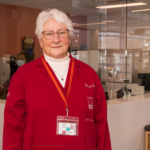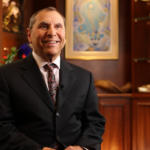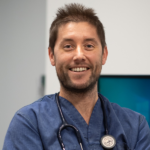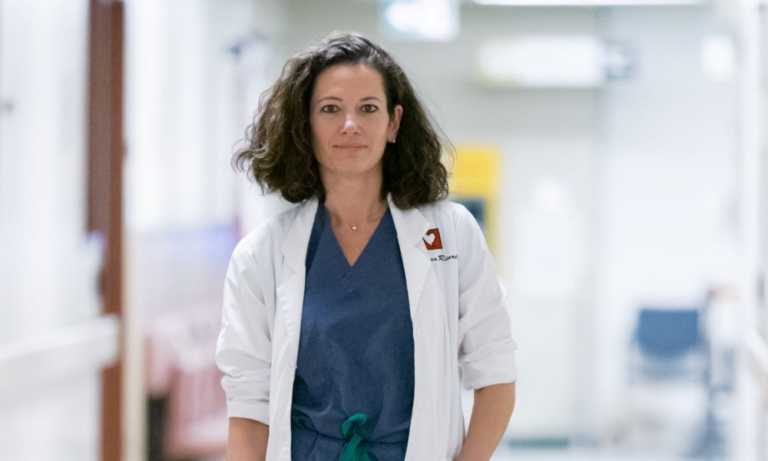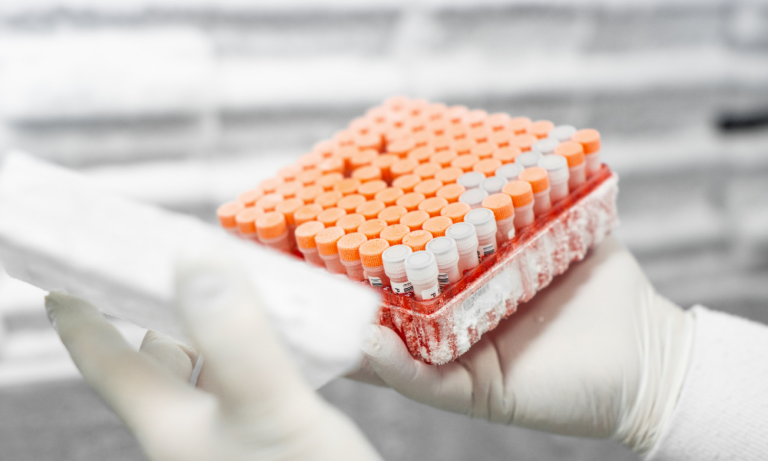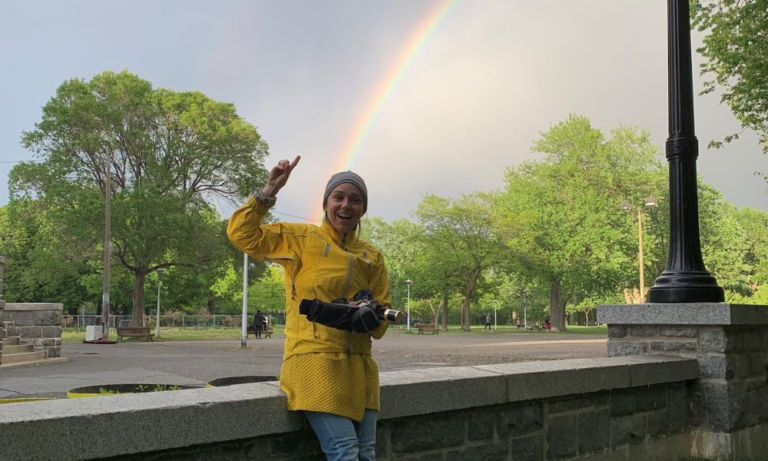Dr. Sarah Gagliano Taliun: using genetics to keep hearts healthy
Foundation
Home > Blog > Dr. Sarah Gagliano Taliun: using genetics to keep hearts healthy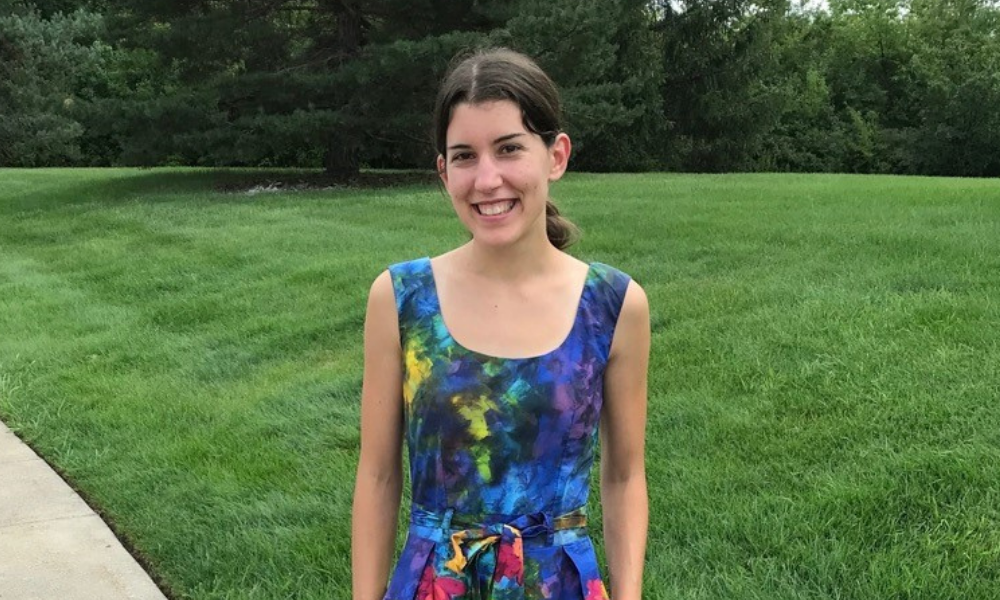
Born in Ontario, Dr. Sarah Gagliano moved to Montreal in 2020 during a global pandemic to join the Montreal Heart Institute’s research team. This is the story of a bright researcher who loves to take on challenges!
Going abroad to hone your skills
After graduating with a bachelor’s degree in biochemistry and human biology from the University of Toronto, she pursued a PhD at the same university in statistical genetics and computational genetics, her current field of research. “My parents never went to college, but they still conveyed to my sister and me the importance of getting an education,” said Dr. Gagliano Taliun.
After an internship in London in the United Kingdom, Dr. Gagliano Taliun headed to the University of Michigan for her postdoctoral research. The University of Michigan is a world-class institution renowned for its expertise in statistical and computational genetics. The goal of her time abroad was to develop her knowledge and to understand what was being done abroad so she could then use this experience in her future employment in Canada.
Four years of postdoctoral training later, the researcher and assistant professor at the Université de Montréal is involved in research on multifactorial diseases, including cardiovascular diseases, in Montreal.
Adopting Montreal and the Heart Institute family
The moment she set foot in Montreal, Dr. Gagliano Taliun fell in love with the city and her new work environment. “I was really impressed by the warm welcome I received at the Institute. It’s a great team and focused on collaboration. We all support each other. Every expert works in tandem with physicians, computer scientists, and epidemiologists. When we’re faced with complex issues of a genetic nature, it’s important to have access to other areas of expertise. The Institute is an extraordinary place to work and carry out research projects.”
Her European husband also quickly embraced Montreal. “For him, Montreal is like a European city, so he loves it! As for me, I’m just happy to be able to work every day in both official languages. I love the culture, I write in French and in English. Since I’ve been here, my spoken French has continued to improve. It was certainly a challenge at first, but I love it!” The couple even bought a house, proof of their willingness to stick around for a while. “We’re here to stay, that’s for sure,” she said.
A researcher who loves a good challenge
Why did Dr. Gagliano Taliun become interested in research? “For the challenge and my desire to help people. Every day, I have to find new questions and think of innovative techniques to answer these questions. When it comes to health care, research is a vital way of helping people.”
Why specialize in genetics? “First, because I’m actually a twin. Second, it’s a field that nicely combines creativity with logical and rational knowledge. I love math, statistics, and numbers, but I’m also someone who is creative. I’ve been playing the piano since I was a young child and I’ve been writing non-scientific articles for newspapers and magazines. Genetics allows me to use both of these aspects of my personality.”
Using genetics to prevent cardiovascular diseases
As part of the Institute’s Research Centre, Dr. Gagliano Taliun has two projects in her sights. One that is she is currently working on and another that she is about to begin.
Targeting the risks of cardiovascular diseases by identifying models specific to men and women
Dr. Gagliano Taliun’s current research focuses on the development of predictive models specific to a person’s sex and is part of a personalized medicine approach in cardiovascular health. In fact, she received a grant in artificial intelligence in health and digital health from the Fonds de recherche du Québec – Santé (FRQS) for the project. “The goal is to come up with models to identify individuals who are at a higher risk of heart disease and that these models are specific to their sex,” she said. A major project that will help make up for the lack of representation for women in clinical research.
The symptoms and consequences of heart disease are vastly different for men and women. Because not as much data has been gathered on women in this field, they have more trouble identifying their symptoms and diagnosing their condition. Dr. Gagliano Taliun aims to rectify this situation. One of the benefits of working at the Institute is having access to its Biobank which has collected genetic data on more than 20,000 people, making it one of the biggest hospital cohorts in the world. “Thanks to the quantity and quality of the data it has, this unique tool will play a key role in my research.”
Studying the links between the cardiovascular and neurological systems
“I’ve been working to determine the genetic factors that affect neurodegenerative diseases, such as Alzheimer’s and Parkinson’s. ”Very clear links exist between the cardiovascular and neurological systems, which influence each other, but the details are not yet well known. Dr. Gagliano Taliun’s next research project will aim to shine a light on these links. “I’m going to analyze the genetic variations that have an impact on the cardiovascular and neurological health of a patient, more specifically in the context of degenerative diseases.”
Is studying multiple systems at once the future of research? “I believe this is the case. Working in tandem with experts of each system of the human body is the next logical step because every system is interconnected. They definitely affect each other.”
The importance of funding research
Every new treatment and method of diagnosis is the result of years of research. This behind-the-scenes work is massive but necessary to prevent cardiovascular diseases, improve treatments, and reduce risks. “Funding research means helping improve the health of our families, friends, community, and future generations,” she said.
The Foundation: supporting research
The Montreal Heart Institute’s Biobank was created thanks to investments from the Foundation and its donors. As demonstrated by Dr. Gagliano Taliun’s work, the Biobank has enabled researchers to reduce the clinical differences between men and women and create a pool of data that is big enough for use in specific, exhaustive studies. By supporting university studies, the Foundation is encouraging the next generation of scientists who will be asking important questions in order to improve the health of our community and shape the medicine of tomorrow.
Cardiovascular diseases are the world’s leading cause of death. Want to help reverse this trend and support research? Donate now to the Montreal Heart Institute Foundation.
donate today
